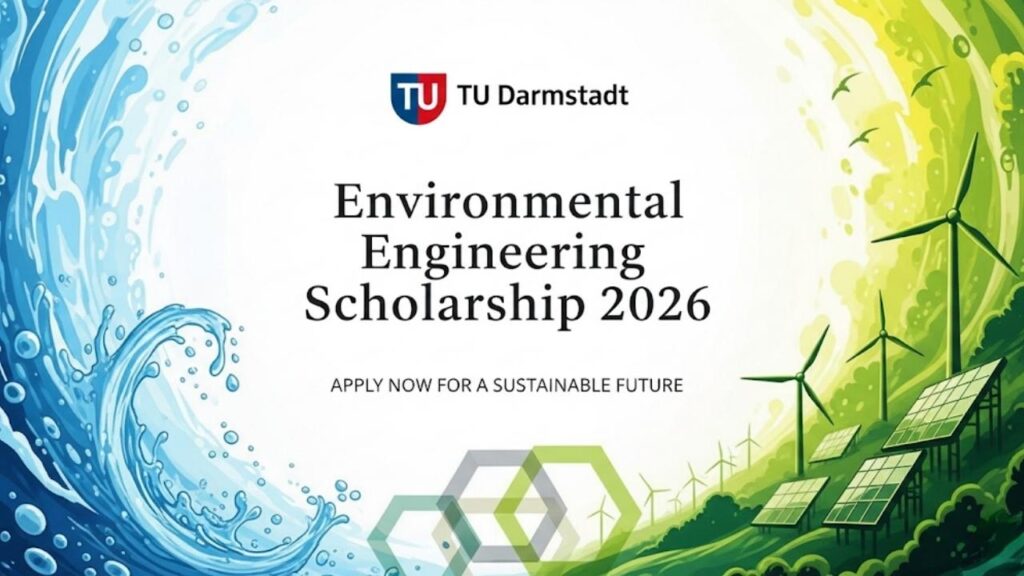Are you a passionate, driven student with a vision for a more sustainable world? Are you dreaming of a Master’s degree that combines cutting-edge research with real-world impact? The TU Darmstadt Environmental Engineering Scholarship 2026 might be the key to turning that dream into a reality. This guide is designed to provide you with the comprehensive, actionable information you need to successfully navigate the application process. We’ll cover everything from eligibility criteria and required documents to crafting a standout application that captures the attention of the selection committee.

Why TU Darmstadt and Environmental Engineering?
Germany has long been a global leader in environmental innovation, and Technische Universität Darmstadt (TU Darmstadt) stands at the forefront of this movement. The university’s commitment to research and its strong ties to industry make it an ideal place to study. Specifically, the Master’s program in Tropical Hydrogeology and Environmental Engineering (TropHEE) and similar programs at TU Darmstadt offer a unique blend of scientific rigor and practical application, preparing students to tackle the most pressing environmental challenges facing our planet today. TU Darmstadt DAAD GSSP Program.
The TU Darmstadt Environmental Engineering Scholarship 2026 is often tied to prestigious programs like the DAAD (German Academic Exchange Service) scholarships. These are not just about financial aid; they are a gateway to a world-class education, a vibrant international community, and a powerful professional network.
Understanding the Scholarship Landscape
It’s important to know that while TU Darmstadt itself offers various forms of financial support, many of the most sought-after scholarships for international students, like the DAAD’s Development-Related Postgraduate Courses (EPOS) program, are managed externally. These scholarships are designed to support students from developing countries who are committed to returning home to apply their knowledge. The deadlines for these programs are often earlier than the university’s general application deadlines, so planning ahead is crucial.
Essential Steps for a Successful Environmental Engineering Scholarship Application
Securing a scholarship is a competitive process, but it is far from impossible. In my experience advising students, the common denominator among successful applicants is a meticulous, well-prepared approach. It’s about more than just your grades; it’s about telling a compelling story that showcases your potential and passion.
Here’s a breakdown of the key steps to take:
1. Confirm Your Eligibility and Program Fit
Before you write a single word of your motivation letter, you must ensure you meet the fundamental requirements. The DAAD, for instance, has very specific criteria for its scholarships. For the TropHEE Master’s program at TU Darmstadt, DAAD scholarship applicants must have at least two years of professional experience in a relevant field and a Bachelor’s degree in Geosciences, Civil Engineering, or Environmental Engineering, with a strong foundation in natural sciences.
Your previous academic and professional work should align with the program’s focus. The TropHEE program, for example, emphasizes the sustainable development of tropical and subtropical regions. Your application should clearly demonstrate your interest and experience in this area.
2. Gather Your Documents: A Checklist for Success
The application process is a document-heavy undertaking. Starting early is not just a recommendation—it’s a necessity. Here is a general list of documents you will likely need. Always check the official program and scholarship websites for their specific requirements, as they can change.
- Academic Transcripts and Certificates: Official transcripts from all universities you have attended, along with your Bachelor’s degree certificate.
- Proof of English Language Proficiency: This is a non-negotiable requirement. Accepted tests typically include TOEFL (iBT score of 95) or IELTS (score of 7.0), but other certifications may also be accepted.
- Curriculum Vitae (CV): A detailed and well-structured CV highlighting your academic history, professional experience, research projects, and any relevant extracurricular activities.
- Motivation Letter: This is perhaps the most important document in your application. It’s your chance to tell your story, explain your motivations, and convince the committee that you are the right fit.
- Letters of Recommendation: At least two letters, preferably from academic professors or professional supervisors who can speak to your abilities and character.
- Proof of Professional Experience: As mentioned, many scholarships require this. Official letters from previous employers or a well-documented portfolio of projects can serve as proof.
- A Research Proposal (for PhD applicants): While this is not always required for Master’s programs, some specialized tracks may ask for a brief outline of your research interests.

3. Crafting a Compelling Motivation Letter
Your motivation letter is where your personality and passion shine through. This isn’t just a list of your achievements; it’s an opportunity to connect the dots. I’ve seen many successful applicants focus on a few key elements:
- Start with a Hook: Begin with a powerful statement that explains why you are drawn to environmental engineering at TU Darmstadt.
- Connect Your Past to Your Future: Explain how your academic background and professional experience have prepared you for this specific program. Use specific examples. For instance, “My work on a community-based water sanitation project in [Country] opened my eyes to the need for advanced hydrogeological solutions, a subject I see directly addressed in the TropHEE curriculum.”
- Show, Don’t Just Tell: Instead of saying you are “passionate about sustainability,” describe a project you led or a problem you helped solve that demonstrates this passion.
- Why Germany? Why TU Darmstadt? The selection committee wants to know you’ve done your homework. Mention specific professors, research groups, or course modules that align with your interests. Show that this isn’t just a generic application.
- Outline Your Future Impact: Conclude by explaining how you plan to use this degree to make a positive impact in your home country or on a global scale. This is especially important for DAAD scholarships.
A quick tip from my professional experience: Proofread your letter meticulously. A single typo or grammatical error can undermine the impression of a serious and detail-oriented applicant.
4. Understanding the Application Timeline and Deadlines
Deadlines are absolute. Missing a deadline by even a day can result in an automatic rejection. For the TU Darmstadt Environmental Engineering Scholarship 2026 tied to the DAAD EPOS program, the deadline for the TropHEE program is November 30, 2025 (for the winter term of 2026/2027). You must submit your application to the university itself by this date, and they will then forward the nominations to the DAAD. This is a critical detail to remember.

5. What to Expect After You Apply
Once you submit your application, the waiting game begins. The selection process is a multi-step journey. First, the university’s selection committee will review all applications and nominate a select few candidates to the DAAD. The DAAD then makes the final decision. This process can take several weeks or even months. During this time, it is vital to stay patient and prepare for the next steps, which may include an interview.
Your Ultimate Guide to the Rotary Yoneyama Memorial Scholarship 2026
Acing Your Application: A Guide to INSEAD MBA Scholarships for the January 2026 Intake
FAQ
Q1: What is the primary scholarship for Environmental Engineering students at TU Darmstadt?
A: For international students, the most common and prestigious scholarship for the Environmental Engineering Master’s program (like TropHEE) is the DAAD’s Development-Related Postgraduate Courses (EPOS) scholarship.
Q2: Are there other scholarships besides DAAD?
A: Yes. TU Darmstadt offers other internal scholarships and can provide information on various external funding bodies. It is recommended to explore options like the Deutschlandstipendium and foundations such as the Thomas Weiland Foundation, which provides support for STEM students at the university.
Q3: Do I need to be fluent in German to apply?
A: The Master’s program in Tropical Hydrogeology and Environmental Engineering at TU Darmstadt is taught entirely in English. Therefore, strong English language skills (proven by a TOEFL or IELTS score) are required, and German fluency is not a prerequisite for admission. However, learning some basic German is highly recommended for daily life.










